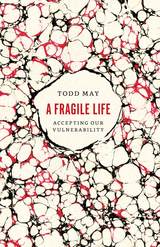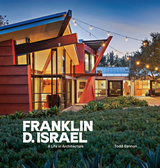5 start with U start with U
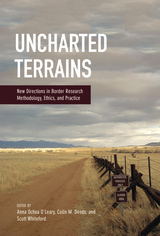
Each chapter raises methodological and ethical questions relevant to conducting research in transnational contexts, which can frequently be unpredictable or even volatile. The volume addresses the central question of how can scholars work with vulnerable migrant populations along the perilous US–Mexico border and maintain ethical and methodological standards, while also providing useful knowledge to stakeholders? Not only may immigrants be afraid to provide information that could be incriminating, but researchers may also be reluctant to allow their findings to become the basis of harsher law enforcement, unjustly penalize the subjects of their research, and inhibit the formulation of humane and effective immigration policy based on scholarly research.
All of these concerns, which are perfectly legitimate from the social scientists’ point of view, can put researchers into conflict with legal authorities. Contributors acknowledge their quandaries and explain how they have dealt with them. They use specific topics—reproductive health issues and sexually transmitted diseases among immigrant women, a study of undocumented business owners, and the administration of the Mexican Household Survey in Phoenix, among others—to outline research methodology that will be useful for generations of border researchers.
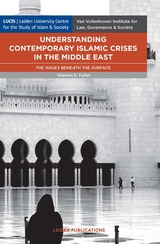
First, Graham E. Fuller focuses on Shari’a law and its appropriate role, if any, in the politics and governance of the Muslim world, thereby further exploring why identity may be the most important factor in examining politics in the Middle East today. He also addresses the current Shi’ite-Sunni conflict, going beyond theological approaches found in most Western analysis to better understand the many more extra-religious factors also at work. Perhaps most importantly, this book claims that the appearance of ISIS has stretched the perennial phenomenon of political Islam to the extreme. Fuller concludes by asking what ISIS implies for the future of the Middle East and for Muslims’ understanding of Islam itself.
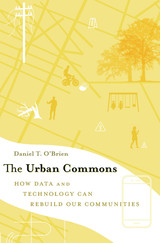
The future of smart cities has arrived, courtesy of citizens and their phones. To prove it, Daniel T. O’Brien explains the transformative insights gleaned from years researching Boston’s 311 reporting system, a sophisticated city management tool that has revolutionized how ordinary Bostonians use and maintain public spaces. Through its phone service, mobile app, website, and Twitter account, 311 catalogues complaints about potholes, broken street lights, graffiti, litter, vandalism, and other issues that are no one citizen’s responsibility but affect everyone’s quality of life. The Urban Commons offers a pioneering model of what modern digital data and technology can do for cities like Boston that seek both prosperous growth and sustainability.
Analyzing a rich trove of data, O’Brien discovers why certain neighborhoods embrace the idea of custodianship and willingly invest their time to monitor the city’s common environments and infrastructure. On the government’s side of the equation, he identifies best practices for implementing civic technologies that engage citizens, for deploying public services in collaborative ways, and for utilizing the data generated by these efforts.
Boston’s 311 system has narrowed the gap between residents and their communities, and between constituents and local leaders. The result, O’Brien shows, has been the creation of more effective policy and practices that reinvigorate the way citizens and city governments approach their mutual interests. By unpacking when, why, and how the 311 system has worked for Boston, The Urban Commons reveals the power and potential of this innovative system, and the lessons learned that other cities can adapt.

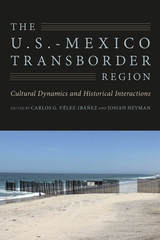
The U.S.-Mexico Transborder Region presents advanced anthropological theorizing of culture in an important regional setting. Not a static entity, the transborder region is peopled by ever-changing groups who face the challenges of social inequality: political enforcement of privilege, economic subordination of indigenous communities, and organized resistance to domination.
The book, influenced by the work of Eric Wolf and senior editor Carlos G. Vélez-Ibáñez, centers on the greater Mexican North/U.S. Southwest, although the geographic range extends farther. This tradition, like other transborder approaches, attends to complex and fluid cultural and linguistic processes, going beyond the classical modern anthropological vision of one people, one culture, one language. With respect to recent approaches, however, it is more deeply social, focusing on vertical relations of power and horizontal bonds of mutuality.
Vélez-Ibáñez and Heyman envision this region as involving diverse and unequal social groups in dynamic motion over thousands of years. Thus the historical interaction of the U.S.-Mexico border, however massively unequal and powerful, is only the most recent manifestation of this longer history and common ecology. Contributors emphasize the dynamic “transborder” quality—conflicts, resistance, slanting, displacements, and persistence—in order to combine a critical perspective on unequal power relations with a questioning perspective on claims to bounded simplicity and perfection.
The book is notable for its high degree of connection across the various chapters, strengthened by internal syntheses from notable border scholars, including Robert R. Alvarez and Alejandro Lugo. In the final section, Judith Freidenberg draws general lessons from particular case studies, summarizing that “access to valued scarce resources prompts the erection of human differences that get solidified into borders,” dividing and limiting, engendering vulnerabilities and marginalizing some people.
At a time when understanding the U.S.-Mexico border is more important than ever, this volume offers a critical anthropological and historical approach to working in transborder regions.
Contributors:
Amado Alarcón
Robert R. Álvarez
Miguel Díaz-Barriga
Margaret E. Dorsey
Judith Freidenberg
Ruth Gomberg-Muñoz
James Greenberg
Josiah Heyman
Jane H. Hill
Sarah Horton
Alejandro Lugo
Luminiţa-Anda Mandache
Corina Marrufo
Guillermina Gina Núñez-Mchiri
Anna Ochoa O’Leary
Luis F. B. Plascencia
Lucero Radonic
Diana Riviera
Thomas E. Sheridan
Kathleen Staudt
Carlos G. Vélez-Ibáñez
READERS
Browse our collection.
PUBLISHERS
See BiblioVault's publisher services.
STUDENT SERVICES
Files for college accessibility offices.
UChicago Accessibility Resources
home | accessibility | search | about | contact us
BiblioVault ® 2001 - 2025
The University of Chicago Press





